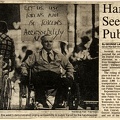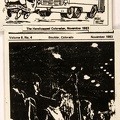Rocky Mountain News 10/26/83
Two PHOTOS (by Rocky Mountain News staff photographer David Cornwell).
PHOTO 1: Close up of a man (Mark Johnson) and a woman (Renata Conrad aka Rabe) looking down at a paper, as if conferring. She is holding a microphone in her hand. Beside them sits another man.
Caption reads: Mark Johnson and Renate Rabe speak at meeting with transit officials.
PHOTO 2: Down a long institutional looking hallway a group of people in wheelchairs and people walking head away from the camera.
caption reads: After the meeting, some in wheelchairs exit via hotel's freight elevator.
[Headline] Freight elevator raises ill will at meeting
By JOSEPH B. VERRENGIA
Rocky Mountain News Staff Writer
The dispute over access by the handicapped to public transportation crystallized Wednesday when wheelchair-bound speakers at a transit convention resisted suggestions that they use the freight elevator at the Denver Hilton to reach the upstairs meeting.
“They (transit officials) told us to ride up the elevator that will later take down the garbage and trash from your lunch," Trudy Knutson of Denver told hundreds of bus and rail operators at a meeting of the American Public Transit Association.
"This was ordered by ... your leadership," she told the transit operators.
APTA officials said they suggest using the freight elevator because it is about 20 feet from the banquet hall where the convention was being held. They said lobby elevators were farther away and were packed with many of the convention‘s 3.500 delegates.
"They were free to use whichever (elevator) they wanted." said Jack Gilstrap, APTA executive vice president. “The freight elevator is much larger. You can fit only a couple of wheelchairs in a (lobby) elevator at a time."
About 50 handicapped persons from ll states and Washington, D.C., attended the convention‘s morning session as Knutson and others called on APTA to pass a resolution endorsing complete handicapped access on all public transit and other demands.
Many of the disabled in the audience used the freight elevator to leave the hotel following the presentation of their demands. Gilstrap said it showed that APTA's suggestion was a practical one.
However, Knutson and others said the freight elevator issue was indicative of the way many rail and bus systems treat their disabled riders as a nuisance or an afterthought.
She said access to public transit is a civil right, a position many transit operators reject.
"A society that puts a man on the moon can surely put a person who is in a wheelchair on a bus," Knutson said.
The handicapped protesters received a boost from Atlanta Mayor Andrew Young, who met with the disabled outside the hotel after he spoke to the convention.
"We have to design public transit to take care of everyone from (ages) 10 to 100," Young said.
According to an agreement signed by APTA, handicapped groups and Mayor Federico Pena‘s office, handicapped activists were allowed limited picketing rights outside the Hilton during the convention and a 20-minute presentation during the general session Wednesday.
Handicapped speakers asked for federally mandated 100 percent accessibility and a notice by APTA to bus manufacturers that its members will buy only accessible vehicles.
Gilstrap said the group's demands would be referred to study groups and a resolution considered late.
APTA has resisted 100 percent accessibility requirement because wheelchair lifts, elevators and other equipment are expensive and the number of handicapped riders is comparatively low.
"It's tough to put money into services that aren't used" Gilstrap said. “It's a manager's dilemma. It‘s used so lightly that it‘s almost ridiculous."
For example, Gilstrap said the Regional Transportation District is one of the leaders in handicapped transportation with 50 percent of its buses accessible during peak hours and 100 percent accessible off-peak.
Yet, in 1982, he said, each of those buses averaged only 25 handicapped trips per year.
Gilstrap said special van service where handicapped riders call in advance and get picked up at home is a better, albeit expensive, idea.
"At least the money spent is spent on carrying people,“ he said.
Denver also offers demand service. The trips-per year average is 1,490, making it far more popular than regular bus service. Handicapped groups believe van service is unconstitutional because it is separate but equal service.
- Created on
- Thursday 11 July 2013
- Posted on
- Wednesday 25 November 2015
- Tags
- 100% lift equipped, ADAPT, ANSI, APTA - American Public Transit Association, freight elevator, Jack Gilstrap, Mark Johnson, Mayor Andrew Young, Mayor Federico Pena, Renate Conrad, resolution, separate but equal, Trudy Knutson, wheelchair bound
- Visits
- 3001
- Rating score
- no rate
- Rate this photo


0 comments